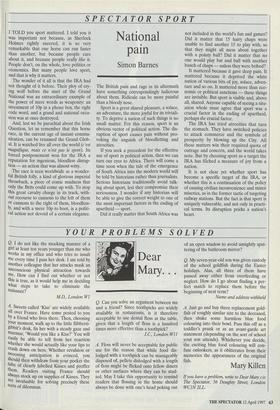SPECTATOR SPORT
National pain
Simon Barnes
I TOLD you sport mattered. I told you it was important not because, as Sherlock Holmes rightly sneered, it is so very remarkable that one horse can run faster than another, but because people care about it, and because people really like it. People don't, on the whole, love politics or economics. But many people love sport, and that is why it matters.
The wonder of it all is that the IRA had not thought of it before. Their ploy of cry- ing wolf before the start of the Grand National was an extraordinary example of the power of mere words as weaponry: an investment of 10p in a phone box, the right code word, and a grand and national occa- sion was at once destroyed.
And, lest we be parochial about the Irish Question, let us remember that this horse race, in the current age of instant commu- nication, can be renamed the Grand Glob- al. It is watched live all over the world (c'est magnifique, mais ce n'est pas le sport). Its forced postponement won for the IRA a reputation for ingenious, bloodless disrup- tion — an action that was almost witty.
The race is seen worldwide as a wonder- ful British folly, a kind of glorious imperial throwback, a piece of comic madness that only the Brits could come up with. To stop this great cavalry charge in its track, with- out recourse to cannons to the left of them or cannons to the right of them, bloodless- ly, and with a mere 10p to boot, is a politi- cal action not devoid of a certain elegance. The British pain and rage in its aftermath have something correspondingly ludicrous about them. Ridicule can be more painful than a bloody nose. Sport is a great shared pleasure, a solace, an adventure, the more joyful for its triviali- ty. To deprive a nation of such things is no small matter. For this reason, sport is an obvious vector of political action. The dis- ruption of sport causes pain without pro- voking the anguish of bloodletting and atrocities.
If you seek a precedent for the effective use of sport in political action, then we can turn our eyes to Africa. There will come a time soon when the tale of the emergence of South Africa into the modern world will be told by historians rather than journalists. Serious historians traditionally avoid talk- ing about sport, lest they compromise their seriousness. I wonder if any historian will be able to give the correct weight to one of the most important factors in the ending of apartheid — sport. Did it really matter that South Africa was not included in the world's fun and games? Did it matter that 15 hairy chaps were unable to find another 15 to play with, so that they might all mess about together with a pointy ball? Did it matter that no one would play bat and ball with another bunch of chaps — unless they were bribed?
It mattered because it gave deep pain. It mattered because it deprived the white nation of various bits of joy, solace, adven- ture and so on. It mattered more than eco- nomic or political sanctions — these things are invisible. But sport is visible and, above all, shared. Anyone capable of seeing a situ- ation whole must agree that sport was a crucial factor in the ending of apartheid, perhaps the crucial factor.
The IRA has tried atrocities that turn the stomach. They have switched policies to attack commerce and the symbols of prosperity by blowing up the City. All these matters win their required quota of outrage and concern, and the world takes note. But by choosing sport as a target the IRA has filched a measure of joy from a nation.
It is not clear yet whether sport has become a specific target of the IRA, or whether this is a continuation of the policy of causing civilian inconvenience and minor miseries, as in the former tactic of targeting railway stations. But the fact is that sport is uniquely vulnerable, and not only in practi- cal terms. Its disruption pricks a nation's heart.


































































 Previous page
Previous page